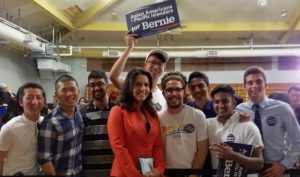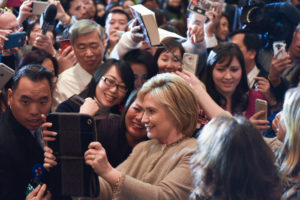
By Aswin Mannepalli
Nathan Lowe is the son of first-generation Chinese Americans who deeply identified with their Evangelical faith and the Republican Party. His turn leftward began after his exposure to Asian American and ethnic studies courses. “I got involved in a local community organization that was formed to fight Walmart’s incursion into LA Chinatown,” he remembered.
He supports Senator Bernie Sanders for president and volunteers for his campaign. Nathan is part of a trend that sees young Asian Americans lean further to the left than prior generations.
Professor Karthick Ramakrishnan analyzes AAPI politics and he finds that AAPIs younger than 35, just as the general electorate in their age group, strongly support the Vermont senator. An Asian American voter survey commissioned by Asian and Pacific Islander American Vote, Asian Americans Advancing Justice, and AAPI Data found that while Clinton leads overall among Asian Americans with 33% support to Sanders’s 26%, Bernie has decisively captured the 18–34 share with 61% support. Clinton has held leads among older age-groups.
“Young Asian American voters’ strong support for Sanders is in line with their ideology—they are more likely than older Asian Americans to call themselves liberal, and they are even more progressive than the general Asian American population when it comes to issues like raising the minimum wage and making college more affordable,” Professor Ramakrishnan of the University of California, Irvine and AAPI Data said summarizing the study.
Some of those Asian Americans who support Clinton point to her pragmatism as the deciding factor in their vote.
“Hillary supports things like raising the minimum wage, protecting our environment, criminal justice reform, and campaign finance reform, but she is also pragmatic about the ways in which she wants to enact these goals,” said Sahil Mehrotra. A rising senior at the College of William and Mary, he co-founded a pro-Hillary student group on campus.
He acknowledges, however, that Hillary’s message is not immediately resonating with Sahil’s generation. “In general,” he conceded, “I think my generation might be considered pro-Bernie.”
Professor Larry Shinagawa, former Director of University of Maryland Asian American Studies Program said “many older Asian Americans have long standing established relationships with the former Clinton and Obama administrations and this familiarity is the key driver of support for the Hillary campaign,”
Younger Asian Americans, on the other hand, exist politically and economically outside of this structure and are more vulnerable and consequently attuned to changes that are reshaping American life. “They are experiencing the fundamental transformation of America and feel that the challenges this post-modern society faces can best be addressed by Senator Sanders,” Professor Shinagawa added.
Perhaps the complicated calculus that underpins the voting decisions of Asian Americans can best be seen in the case of 80-20 Initiative’s decision to endorse Hillary Clinton for the Democratic primary. The organization was founded by the 21st Lieutenant Governor of Delaware, Dr. S.B. Woo, and advocates for Asian American causes.
“In my heart I liked Bernie’s candidacy more,” Woo,79, said. “But I worked very hard to get Asian Americans to vote for Hilary in the California primary, because 80-20 as a group decided that Hillary had the better likelihood to fulfill her promises to AAPIs than Bernie.”
“Hillary Clinton is the most qualified person to run for president in recent memory, and with her, we will be stronger together,” said Mehrotra, the student at William and Mary College who started the pro-Hillary campus group. That said, Sahil believes that Clinton will draw more support as the general election nears. “I think that the level of excitement for Hillary from my generation is understated in general, and I’m excited to see it revealed in the coming weeks and months,” he predicted.
Interestingly, the popular Feel the Bern campaign slogan was popularized by an Asian American, Winnie Wong, who co-founded People for Bernie. Wong’s work is credited with bringing many new voters into mainstream politics. But will they stay?
Professor Ramakrishnan isn’t so sure. He believes the implications for the Democratic Party and Asian America are still unclear. “It remains to be seen whether many of these first-timers will continue to be involved, either with the Clinton campaign or in trying to push for progressive politics in the months and years ahead.”
(AsAmNews is an all-volunteer effort of dedicated staff and interns. You can show your support by liking our Facebook page at www.facebook.com/asamnews, following us on Twitter and sharing our stories.)
